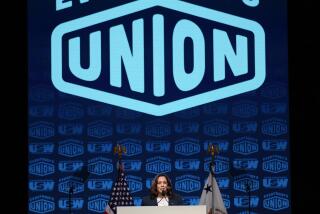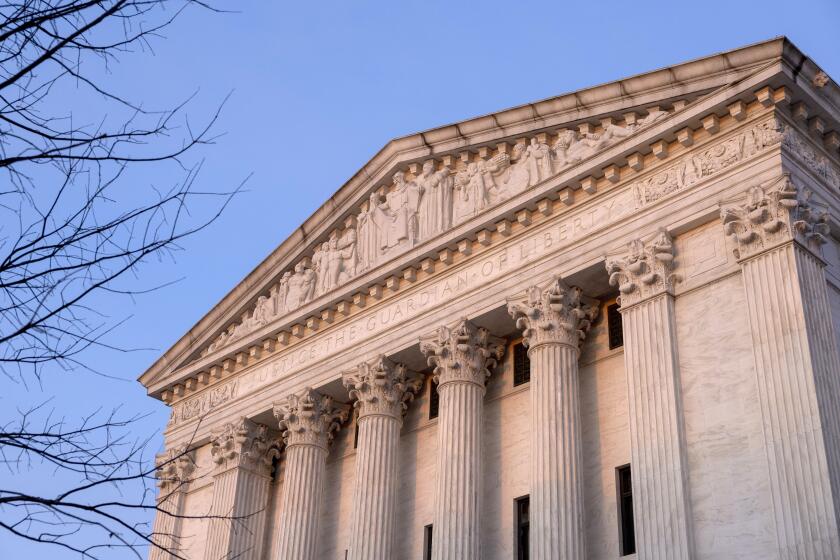Iowa Squeaker Could Complicate Rather Than Clarify Campaigns
The Iowa caucuses are supposed to provide the first answers in the presidential nomination race. But this year, they may only supply questions.
In its final days, the contest has become an unprecedented four-way sprint that is pushing the candidates to the limits of their skills and endurance. Yet when they look up after the results Monday night, the Democrats may find they haven’t moved very far from the starting line in their competition.
The caucuses frequently have buried rather than launched candidates -- identifying losers instead of anointing winners in the nomination process. This year, though, with the candidates packed together so closely in the polls, Iowa may not play that winnowing function.
Depending on the order of finish, all of the major candidates who competed here -- former Vermont Gov. Howard Dean, Rep. Dick Gephardt of Missouri and Sens. John F. Kerry of Massachusetts and John Edwards of North Carolina -- could wake up Tuesday with enough strength and credibility to sustain their campaigns.
A pile-up finish in Iowa would immediately increase the incentive for these contenders to open fire on retired Gen. Wesley K. Clark, who has built a powerful wave of momentum in New Hampshire while ignoring the caucuses. Such attacks, on issues from Clark’s previous votes for Republican presidents to his work as a lobbyist, are escalating even before the Iowa race concludes.
“I think Wesley Clark will quickly become the issue in the week between Iowa and New Hampshire,” said a senior advisor to one of the other Democrats. “People look at him, in military terms, as a very soft target.”
Longer-term, a close finish in Iowa could set in motion a dynamic Democrats haven’t seen since 1976: a series of showdowns, with different candidates squaring off in different states as they struggle to target limited time and money.
South Carolina’s primary Feb. 3 could emerge as a battle among Clark, Edwards, Dean and Gephardt; Michigan’s caucuses Feb. 7 as a confrontation between Dean and Gephardt, and perhaps Kerry; Wisconsin as a face-off between Dean and Clark or Edwards.
What’s changed since 1976 is that the nomination calendar has been so condensed and front-loaded that even a wide-open competition would play out over weeks, not months -- intensifying the pressure on candidates to make rapid decisions about where and when to fight.
“People are going to have to make very strategic decisions very quickly about where they settle down to take a stand,” said Andrew Stern, president of the Service Employees International Union, which is backing Dean.
Even when Iowa has delivered a decisive result, its effect on the contests that follow has been mixed. In the seven contested races since 1972, four Democrats who finished first in Iowa won the New Hampshire primary. The three others went on to lose in New Hampshire.
The Republican winner in the three contested Iowa caucuses since 1980 lost in New Hampshire each time.
William Mayer, a political scientist at Northeastern University in Boston, said the Iowa caucuses have influenced the ultimate result in both parties far less than the New Hampshire contest.
Mayer said Iowa’s effect generally has been fleeting even in the Granite State, with the occasional exception such as Gary Hart, whose second-place finish in the caucuses ignited his upset victory over Walter Mondale in New Hampshire’s 1984 primary.
The latest polling in New Hampshire shows Dean still leading, but dropping to about 30%, with Clark running a strong second at more than 20% and Kerry ticking back up to 15% or higher.
Tremors from Iowa might rattle that configuration. A Kerry win here or a close second-place finish probably would further fuel his recovery in New Hampshire. Conversely, even a narrow defeat in Iowa could depress Dean’s support in New Hampshire, though independent analysts and strategists for his rivals believe he is near his floor of hard-core backers in the state.
Indeed, if Kerry and Edwards gain strength from the Iowa results and Dean loses some, the New Hampshire race could replicate Iowa, with those three candidates and Clark bunching together.
A parade of past White House hopefuls -- from Democrats John Glenn, Alan Cranston and Bruce Babbitt to Republicans Howard Baker and Jack F. Kemp -- learned in Iowa they were not going to be president. And Iowa could still play its grim reaper role Monday.
The risk in Iowa seems greatest for Gephardt, who won the state in his failed 1988 nomination bid and has repeatedly stressed its importance to his candidacy this year. Strategists for other campaigns say that though Gephardt could try to regroup in Michigan, it is difficult to see how he would raise enough money to seriously contest for the nomination if he doesn’t win Iowa, especially if he finishes back in the pack.
Gephardt’s backers say he can survive a loss in Iowa. “It is extremely important” to win the caucuses, said James P. Hoffa, president of the International Brotherhood of Teamsters, which has endorsed Gephardt, but “I don’t think it’s fatal if he doesn’t.”
Dean is probably the other candidate with the most at stake in Iowa. Unless he surges to win convincingly, much of the contest’s post-mortem probably will focus on his decline in the last few weeks, amid a barrage of attacks from his opponents and an almost equal number of self-inflicted wounds.
But Dean’s candidacy still has enormous assets. His donor base is larger than any of his rivals’, providing him the capacity to refuel financially if the race becomes a war of attrition into early March, when California, New York and Ohio conduct their primaries.
History is on his side too; since 1984, the candidate who raised the most money in the year before the election, as Dean did among the Democrats last year, has won the nomination in every case in both major parties.
If Dean can’t win Iowa, his campaign would probably prefer that Kerry finish first, one of Dean’s senior advisors said. The reason: a win in Iowa would increase Kerry’s odds of passing Clark in New Hampshire.
The Dean camp views Clark as a greater long-term threat, partly because he has raised significant amounts of money lately and partly because Kerry has made few inroads in the contests that follow Iowa and New Hampshire. Kerry has concentrated his television advertising on those two states; Clark, by contrast, is advertising in eight states beyond New Hampshire.
Veteran Democratic strategist Tad Devine, who is advising Kerry, said the senator’s campaign believes momentum from strong finishes in Iowa and New Hampshire “will have much more influence” on other contests than advertising or organizing that has occurred so far.
If Edwards finishes close to Gephardt, Dean and Kerry in Iowa -- or passes one or more of them -- most analysts expect him to remain politically viable. He has been mired in the low single digits in New Hampshire polls, but his aides promise a vigorous effort there. Still, Edwards may be forced to shift much of his effort to South Carolina, where his aides agree he must win to continue his candidacy.
Starting on Tuesday, the common imperative for all of the Democrats competing in Iowa may be to slow down the one who isn’t: Clark. He looms as a threat to Dean and Kerry in New Hampshire, and to Gephardt and Edwards in South Carolina.
His rivals appear poised to question Clark’s votes for Republican presidential candidates during the 1970s and ‘80s, his praise of President Bush at a 2001 GOP fundraiser and his work as a highly-paid lobbyist after he left the military. Sen. Joe Lieberman of Connecticut, who like Clark decided not to campaign in Iowa, has previewed these criticisms in recent weeks.
Last week, Dean flatly described Clark as a Republican. And union president Stern sent a letter to his members in New Hampshire saying they would “take a huge risk by supporting” Clark because of his “life-long pattern of support for national Republicans.”
Clark’s campaign believes such attacks could allow him -- as Edwards has done effectively in Iowa -- to win support by denouncing negative campaigning. He also could use the assaults to stress his independence, usually an asset in New Hampshire.
“If they want to come after Wes Clark about being somewhat independent and they want to do that in New Hampshire, I’m in a ‘Bring it on’ mode,” said one of his senior advisors.
More to Read
Get the L.A. Times Politics newsletter
Deeply reported insights into legislation, politics and policy from Sacramento, Washington and beyond. In your inbox three times per week.
You may occasionally receive promotional content from the Los Angeles Times.






